protests

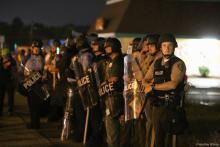
An imminent grand jury verdict in St. Louis County will determine whether to indict Ferguson police office Darren Wilson on criminal charges for shooting Michael Brown. News reports have detailed the expectation of violence in the St. Louis area after the decision is handed down and the mobilization being planned by law enforcement in response. This is an open letter to Missouri Gov. Jay Nixon urging him to maintain peace and protect those exercising their right to free speech. I encourage you to read the letter and join me and others across the country in signing it now. Your voice can make a difference. Sojourners will send the letter and signatures to the Gov. Nixon. – Jim Wallis, Sojourners
Dear Gov. Nixon,
For the last several months, the nation’s eyes have been on Ferguson, Mo. Few had heard of this small St. Louis suburb until Michael Brown was shot and killed by a member of the city’s police department — whose mission is supposedly to serve and protect. Now this community is an infamous global symbol of the nation’s continued struggle for racial equality and the troubling trend of police militarization.
Jesus proclaimed, “Blessed are the peacemakers for they shall be called the children of God” (Matthew 5:9). The Rev. Dr. Martin Luther King Jr. reminded us, “True peace is not merely the absence of tension: it is the presence of justice.” These are not idealistic thoughts or nice sentiments to be dismissed when tensions and conflict arise. Rather, they are wise words of truth that should guide our thinking in moments of distress. We need to make Jesus’ instruction real and consider Dr. King’s words a practical exhortation for the ensuring peace and public safety in Ferguson once the grand jury has made the decision of whether to indict Darren Wilson.


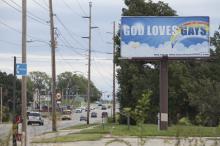
As small bands of protesters from Westboro Baptist Church take their trademark “God Hates Fags” signs to demonstrations outside funerals, concerts, and schools across the country, a new message has come to their Topeka, Kan., headquarters: “God loves gays.”
The God Loves Gays Billboard Project launched Aug. 9 on the crowdfunding site Indiegogo, aiming to raise $50,000 to put up a sign about three miles from the church. Organizers hoped to reach the goal by Oct. 8 but surpassed it about a month and a half early.
On Oct. 6, the campaign reached $100,000, two days after the announcement that there is space for another billboard, this one in Salt Lake City, the heart of Mormon country.
The project shows the power of harnessing online media — in this case, a crowdfunding site such as Indiegogo — to push back against religious hate speech from a reviled source.
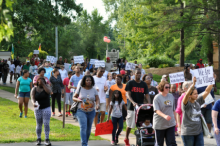
FERGUSON, Mo. — Ever since Michael Brown, a young, unarmed African-American, was shot by a police officer on Aug. 9, various crews have played a part in achieving the tentative peace that has taken hold of the St. Louis suburb once rocked by protests.
Some wear black T-shirts with large white letters that spell out “Peacekeepers.” Others dress in bright orange shirts and call themselves “Clergy United.” All acknowledge that the Nation of Islam has been a key player since the very beginning.
Last week, Capt. Ronald S. Johnson of the Missouri Highway Patrol, who took over the police security patrol in Ferguson, acknowledged on national television that the Nation of Islam and other groups — such as Black Lawyers for Justice — helped control the crowds on West Florissant Avenue. Others on social media pointed out that the Nation of Islam protected businesses from looters.
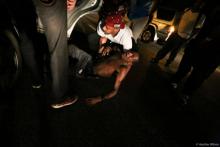
Editor's Note: Rev. Alvin Herring is on the ground in Ferguson, Mo. Following is his account of the events of Aug. 17.
Last night democracy was trampled not as the media would suggest by the angry footfalls of sullen youth determined to disturb the peace and wreak havoc in their own community, but by the heavy march of a police force that seemed determined to create tension and antagonize young people — young people who are carrying the trauma of nights of unrest and lifetimes of dehumanizing racism.
We witnessed with our own eyes beautiful young people peacefully marching in step to cries of “hands up, don’t shoot.” We saw the very young holding older siblings’ hands and the old being pushed in wheelchairs by teenagers who had pain in their eyes but strong voices lifting up their laments to a nation that must find the will to hear them. And though they were clearly agitated, they were courageously hewing to the commitment to act peacefully in the face of an overwhelming police response that seemed determined to escalate an already tense situation.
Law enforcement was outfitted with the machinery of war. The officers wore military fatigues and carried automatic weapons. They were helmeted, with their faces obscured, and in the darkness they looked more like machines than human beings. They perched atop huge military vehicles with glaring lights and screeching sirens. It was otherworldly — and all of this to face down a group of wounded children, wounded tonight and many nights before this night.
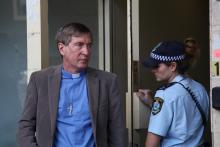
On Monday a nun was arrested here in Australia. That’s right, a nun. She was one of a crowd of Christian leaders who engaged in nonviolent sit-ins at the electorate offices of Bill Shorten and Tony Abbott. This is the latest #LoveMakesAWay action protesting indefinite imprisonment of children in our immigration detention centers. When nuns are cranky at this bipartisan brutality, its fair to say something is gravely wrong.
It was a candid moment with the BBC. Malcolm Turnbull let slip what a lot of decent Australians are thinking, not just placard-waving radicals with witty twitter handles, but families with mortgages who ferry their kids to weekend sport. ‘I don't think any of us are entirely comfortable with any policies relating to border protection’ he said. Malcolm is a team player, so he’s never going to come right out and say it. But nuns will. Desperate people are coming to us seeking safety from persecution, and the way we treat them is wrong.

I suppose it is an indication of how steeped in popular culture I am that the first thing that came to mind when I heard of the death of Westboro Baptist Church founder and former leader Fred Phelps was the song, "Freddie's Dead," by Curtis Mayfield. But although it is a relatively superficial and tangential connection to make, I still prefer that to much of the venom and grave dancing have witnessed since the announcement.
Phelps and his predominantly family-based ministry is best known for their over-the-top protests of everything from gay pride festivals to military funerals, as well as their deeply divisive and inflammatory signs. But given the fact that only a relative handful of people attend Westboro Baptist, and given the extreme nature of their mission and message, Phelps's ability to galvanize and garner the attention of the mainstream media was nothing short of remarkable.
It is less well known that Fred Phelps was kicked out of his own congregation in recent years as the beast of intolerance he had given birth to within his congregation turned even on him. Apparently, even Phelps himself had lost the necessary edge of judgment, anger, and intolerance his followers deemed necessary to champion their cause going forward.

The day after the Washington Post announced it was moving its top environmental reporter off the green beat to cover politics at the White House, this op-ed went up toeing an uncomfortably familiar line: by speaking out against the Keystone XL pipeline, environmentalists are “missing the climate-endangered forest for the trees.”
Leaving aside for a moment the uncomfortable irony of being reprimanded for missing the big fight by an outlet that is reshuffling focus on that very front: the editorial board, respectfully, is wrong. Not that it doesn’t have a point, but that point is concrete and incremental – and misses the entire meaning of the forest of protests over the last 18 months.

Anti-American riots that have spread to more than a dozen countries across the Middle East are a sign of fissures between radical and more moderate Islamists that are vying for power as their societies undergo change, Middle East experts say.
Whether U.S. foreign policy has helped create a political environment where radicals are struggling to remain relevant, or emboldened extremists to act out, is a matter of disagreement.
President Obama's approach to the Arab Spring, to engage with the Islamists and not the secularists, "is seen by our foes as disengagement, while the radicals are not backing off," said Walid Phares, an adviser to the Anti-Terrorism Caucus in the U.S. House of Representatives and author of the 2010 book The Coming Revolution: Struggle for Freedom in the Middle East.
"When we withdraw, they advance."
Tamara Wittes, who served as deputy assistant secretary of state for Near Eastern Affairs until a few months ago, sees it differently.
The U.S. military withdrawal from Iraq removed "a massive source" of grievance for ultra-conservative Muslims, called Salafis, who have been leading the charge in the recent protests and who are ideologically close to Islamic terrorists who have warred with the U.S., Wittes said. "Now they're left trying to gin up anti-American feelings over this campy movie. If Salafi groups are left having to troll the Internet for a pretext, I think we're in pretty good shape."

Worshippers at Toronto's Salahuddin mosque were bracing for protests Friday as part of "Walk Your Dog in Front of a Mosque Day."
The event is being organized by supporters of a man who claims Muslim protestors kicked his English mastiff, Cupcake, during an anti-Israel rally last month.
While claiming that they wanted to draw attention to Muslim attitudes toward dogs, the organizers' Facebook page is replete with hostilities. One man wrote that he would throw protestors into a "lake of fire" and shoot their dogs, and the event has been promoted on a white supremacist website, StormFront.org.
Some Muslims responded with their own "Good Muslims Love Dogs" Facebook page, including at least one photo of a veiled woman with a veiled dog.
Muslims' alleged canine-phobia is often cited by critics of Islam as an example of how the faith is incompatible with Western values. Some Muslims have perpetuated that narrative, such as when a Somali cab driver in Minneapolis made national headlines in 2007 when he refused to let a blind man bring his seeing-eye dog into his car.
Yet many Muslims all over the world have dogs, and dogs figure prominently is some Islamic countries, such as Turkey, famous for its Kangal and Akbash breeds.
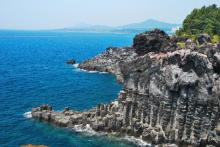
IF YOU HAVE ever been to Jeju, you will understand why it is called a paradise. Lying in the waters south of the Korean mainland, this volcanic island is stunningly beautiful, from its clean mountain streams to its placid coral reefs. Jeju’s legendary female deep-sea divers harvest clams, abalone, and seaweed, relying on lung power alone. The island is also a spiritual place, said to be the body of Korea’s creation goddess, Mago. Jeju has been designated a UNESCO World Heritage Site and a World Biosphere Reserve.
Since January 2011, it’s also been the site where a $970 million naval base is being constructed by the South Korean government, with the help of giant construction corporations such as Samsung. The base, located in the small farming and fishing village of Gangjeong, will occupy a unique three-quarter-mile stretch of coastal wetland, threatening an ecological system that harbors several endangered species. The naval base construction also contributes to increasing military tensions in Asia, raising the risk of a devastating war in the region. Today, islanders, religious leaders, and peace activists are calling attention to dangers caused by joint U.S.-South Korean militarization.
The base is slated to be home to 20 warships, including submarines, aircraft carriers, and destroyers, several of them equipped with missile defense technology with the stated goal of protecting South Korea’s sea lanes and shielding against attack from North Korea. Civilian cruise liners will also be able to dock, according to the government. South Korean naval official Ku Okhyoe told a press conference last fall that U.S. military ships will be allowed to dock at the base only temporarily; Ku insisted, “The base is not intended for a certain country.”
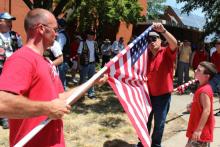
Thousands of people wearing red shirts gathered in downtown Columbia, Mo., July 21 to honor an Army solider killed recently in Afghanistan—and to fend off Westboro Baptist Church.
The controversial church, based in Topeka, Kan., had posted fliers around Columbia in advance of the funeral of Army Spc. Sterling Wyatt, who was killed July 11 by an improvised explosive device.
“These soldiers are dying for the homosexual and other sins of America. God is now America’s enemy, and God Himself is fighting against America," the posters read. "THANK GOD FOR IEDs.”
From the Chicago Sun-Times:
Several thousand protesters spent five hours peacefully chanting, singing and marching against war. At the end, nearly 40 young veterans dramatically took their military medals and hurled them toward McCormick Place, where world leaders met behind closed doors.
It was supposed to end there — at Michigan and Cermak.
But a “Black Bloc” of about 100 anarchists wanted something else. The group, which chanted “What do we want? Dead cops!” as it left Grant Park at 2 p.m., surged to the front of the protest crowd and tried to break through the imposing line of Chicago cops in riot gear blocking its path.
Watch more videos from protests in Chicago inside the blog.
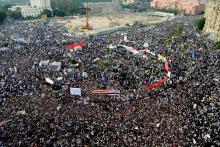
Today is one year to the day since protestors massed in Cairo's now-legendary Tahrir Square. Inspired by events in nearby Tunisia, hundreds of thousands of Egyptians called on their leader, Hosni Mubarak, to step aside and allow democratic reform to take place. The country, the city, the square, were (and remain) icons for what has become known as the Arab Spring.
The protests that began a year ago brought down a government that for too long had failed to care for its citizens in a manner that was good, decent and just. But in the time since, Egypt has walked a difficult path. How are Egyptians marking this poignant anniversary, how do they feel about the changes that have occurred, and what are their hopes for the years to come?
Here’s a round-up of some of the best insights into these questions from around the world:
While citizens across the United States have been demanding President Obama deny the permit for the Keystone XL pipeline, Canadians and First Nations folks have been organizing as well.
One question I’ve been asked repeatedly during the Tar Sands organizing is: “If we stop the mining and oil company from building a pipeline from Alberta to Texas, won’t they just a build one from Alberta to the Pacific and ship the oil to China?”
The companies were only too happy to have us buy their logic. But the truth was that our job in the U.S. was to keep the pipeline out of our backyard, and trust that the Canadian movement would do the same. Well, it turns out they have. First Nations folks pledged to block construction with their bodies and widespread public concern has forced the Harper government to review environmental concerns.

Democrats See Opening To Attract Religious Voters In 2012 Election; Does Inequality Matter?; From Occupy To Progressive Renewal: Demanding The Just Society; Occupy Movement A Reminder Of What We Value; The Annual 'War On Christmas' Shows How A Faith That Once United America Now Divides It; Religious Leaders Target Repeal Of N.C. Death Penalty Law; Gulnare Free Will Baptist Church: Kentucky Congregation Overturns Ban On Interracial Couples.

As we gazed in shock at the battle below, Dr. Nadia quietly stepped back from the balcony.
We turned and saw her sitting alone in her office, hanging her head, shaking it from side to side in dejection. She had just said that the continued clashes were harming the revolution, that unknown forces were at work among the activists and in the military to undermine the revolution and prevent the transition to democracy.
No good can come from this, she said. Little could she have imagined that her words would be so quickly and horribly confirmed.